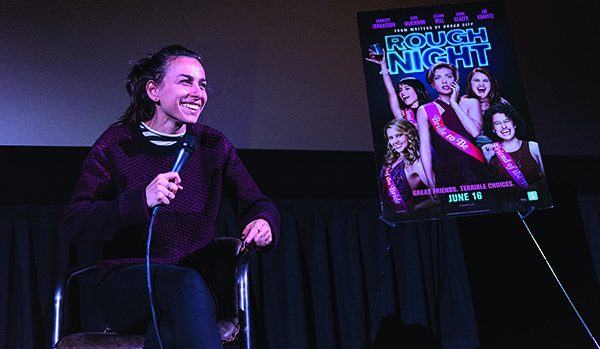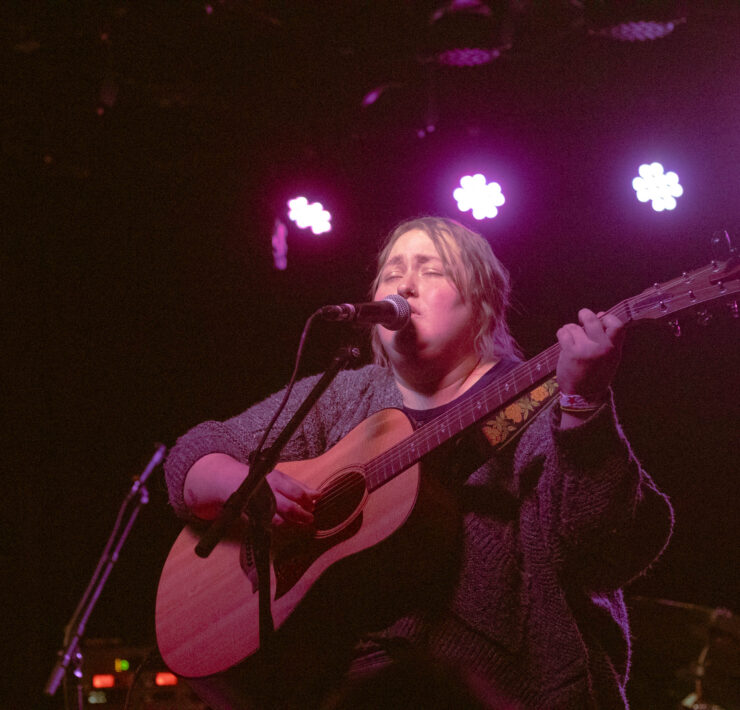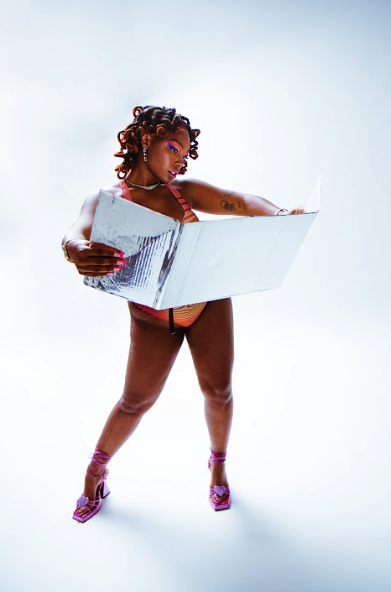Rough Night Destroys Bechtel Test, Highlights Queer People, and Receives RuPaul Seal of Approval

Addison Herron-Wheeler is OUT FRONT's co-publisher and editor-in-chief and friend…
Anyone who has ever indulged in a guilty, “girly” pleasure — Cosmo magazine, a chick flick, a girl’s night out — knows all-too-well the inherent sexism and shaming that come with such things. Sex is only okay if it is to “please your man,” tattoos and plus-sized bodies are unacceptable, and heteronormativity rules the day, shutting out anyone who may identify even slightly outside of that little box.
Lucia Aniello is sick of that. She wants to make it known that women don’t live in that box. We curse, swear, have sex, make crude jokes, do coke, and have relationships outside of the hetero relationship paradigm we’ve grown up with. That’s why Aniello, along with her partner Paul Downs, both of Broad City fame, made Rough Night — a film about real women. While it still sticks to some of the norms that chick flicks are known for, it definitely treads new ground, especially for queer people.
The film features openly-gay actor Colton Haynes, who plays a heterosexual stripper. It also scattered queer people into the main roles in the film.
In the beginning of the film, it is revealed that Zoë Kravitz’s character Blair used to date Frankie, played by Broad City’s Ilana Glazer, during college. We also see that Blair has a son with a soon-to-be ex-husband. During the entire 101 minutes of the film, neither characters’ sexual orientation is discussed. Oh yeah, Demi Moore also plays a bisexual.
OUT FRONT caught up with Aniello after her screening of Rough Night in Denver to talk bisexuality, fluidity, and all things queer.
What made you decide to include bisexual characters in the film? I am trying to reflect people that I know, and I would say most of my friends are bi; I honestly think everyone is bi and just not admitting it… not everybody, but it’s a spectrum.
While I like having characters’ sexual fluidity be kind of treated as something we don’t even need to make a point of, that is something that some people thought we needed to address. Why was it that Blair used to be with a girl and now she’s with a guy; is she this or is she that, and we thought it was a much more progressive thing for us to assume her fluidity and for it not to be made into such a big deal. We didn’t put any labels on it, although I think if somebody was to point-blank ask her she would say she’s bisexual.
What takeaways do you want people to have from
the themes of sexuality in this movie?
Consent is king, and queen, and not to judge sex work, as Frankie literally says. And love wins.
Did you intentionally time this to come out during Pride Month?
No, that was just luck. That was a blessing from she who lives upstairs.
In the film, the plus-sized character is portrayed as under-sexed and under-desired. While some parts of the film definitely defy that and show other sides of her character, that was still a factor. How do you feel about that?
It was important for us to make it clear that she can and should be considered attractive and is considered attractive by men, and it was equally as important to us to have the stripper, who was under the umbrella of sex work, also be considered a romantic interest.
I know a lot of movies sadly fail the Bechdel test even today, meaning that no women in the film talk to each other about anything but men. This movie is the complete opposite. Was this intentional?
The girls might passively have some things to say about guys in their lives, but it really is a love story about the group of girlfriends — specifically Jess (Scarlett Johansson) and Alice (Jillian Bell). It’s really just a byproduct of what the movie really is, which is just a story about them. It’s so sad that movies fail the Bechdel Test so often, but mine usually pass it. *laughs*
How did Ilana Glazer’s involvement in the film come about?
Ilana had read the script pretty early on because she’s a friend and frequent collaborator of mine, but wasn’t actually attached until later.
Casting an ensemble comedy can be a pretty tricky thing because it needs to balance out. We would add one person and it would kind of change the dynamics of everyone else. She got cast somewhere in the middle of the process, but of course being able to work with her is something I love doing. I’m so glad she’s in it.
Is there anything I didn’t ask about that you want the queer community to know about your film?
I think they should come and see the characters. We have gay characters playing straight people, straight people playing gay people, people playing bi people.
I think — I hope — I did my very best be as inclusive with as many orientations as possible, and cast as many people who embody a progressive sexuality.
Also Bob the Drag Queen (RuPaul’s Drag Race) is in the film, and RuPaul loved it — so that’s all I need. It has the RuPaul seal of approval and that’s better than any critic in the world. It was also, as far as I know, the first time the term “cis male” was uttered in a mainstream comedy.
What's Your Reaction?
Addison Herron-Wheeler is OUT FRONT's co-publisher and editor-in-chief and friend to dogs everywhere. She enjoys long walks in the darkness away from any sources of sunlight, rainy days, and painfully dry comedy. She also covers cannabis and heavy metal, and is author of Wicked Woman: Women in Metal from the 1960s to Now and Respirator, a short story collection.










